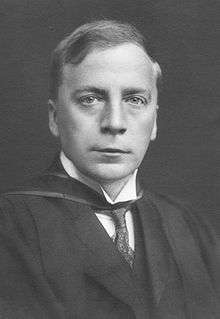William Hewins
| William Hewins | |
|---|---|
 William Hewins circa 1900 | |
| Born | 11 May 1865 |
| Died | 17 November 1931 (aged 66) |
| Nationality | United Kingdom |
| Field | Economics |
William Albert Samuel Hewins (11 May 1865 – 17 November 1931) was a British economist and Conservative politician.[1] In 1895, he was appointed by Sidney Webb as the first Director of the London School of Economics, a post he held until 1903.[2]
Family and education
Hewins was the son of Samuel Hewins, an iron merchant. He was educated at Wolverhampton Grammar School and Pembroke College, Oxford University. He graduated with a degree in mathematics and later worked as a university extension lecturer.
Politics
Hewins resigned from teaching to work for Joseph Chamberlain and his campaign for tariff reform. He unsuccessfully contested Shipley in 1910 and Middleton in 1912 but was successfully returned to Parliament for Hereford in a 1912 by-election. He served in the coalition government of David Lloyd George as Under-Secretary of State for the Colonies from 1917 to 1919. He retired from the House of Commons before the 1918 general election.[1]
He was invited to represent Tory opinions as a member of the Coefficients dining club of social reformers, formed by Sidney and Beatrice Webb in 1902.[3]
In later life Hewins wrote articles for the Encyclopædia Britannica and the Dictionary of National Biography. [4] He also published among other works Trade in Balance (1924), Empire Restored (1927), and the Apologia of an Imperialist (1929).[1]
He died on 17 November 1931, at age 66.
References
- 1 2 3 "William Hewins". British History > History of Socialism. Spartacus Educational. Retrieved 8 December 2013.
- ↑ "LSE's first Director – William Hewins".
- ↑ Gollin, Alfred M. (1984). No Longer an Island: Britain and the Wright Brothers, 1902–1909. Stanford, CA: Stanford University Press. p. 231. ISBN 978-0804712651.
- ↑ W.A.S.H. (1910). "Economics". The Encyclopaedia Britannica; A Dictionary of Arts, Sciences, Literature and General Information. VIII (DEMIJOHN to EDWARD) (11th ed.). Cambridge, England and New York: At the University Press. pp. 899–910. Retrieved 17 July 2018 – via Internet Archive.
External links
| Wikisource has original works written by or about: William Albert Samuel Hewins |
- Hansard 1803–2005: contributions in Parliament by William Hewins
| Educational offices | ||
|---|---|---|
| New office | Director of the London School of Economics 1895–1903 |
Succeeded by Halford Mackinder |
| Parliament of the United Kingdom | ||
| Preceded by John Arkwright |
Member of Parliament for Hereford 1912–1918 |
Succeeded by Charles Pulley |
| Political offices | ||
| Preceded by Arthur Steel-Maitland |
Under-Secretary of State for the Colonies 1917–1919 |
Succeeded by Leo Amery |